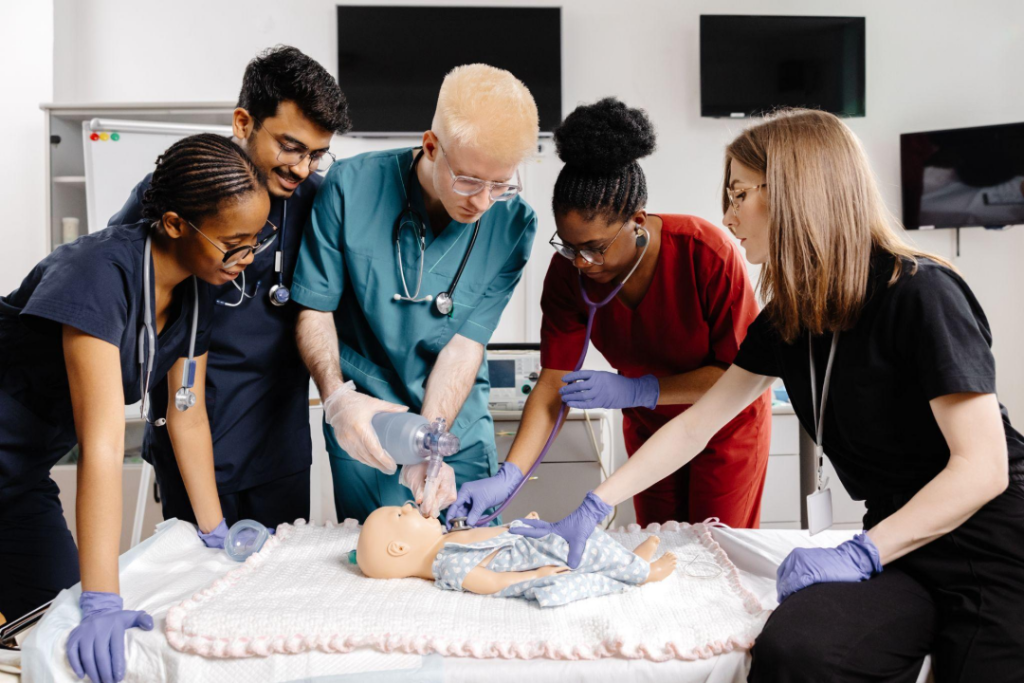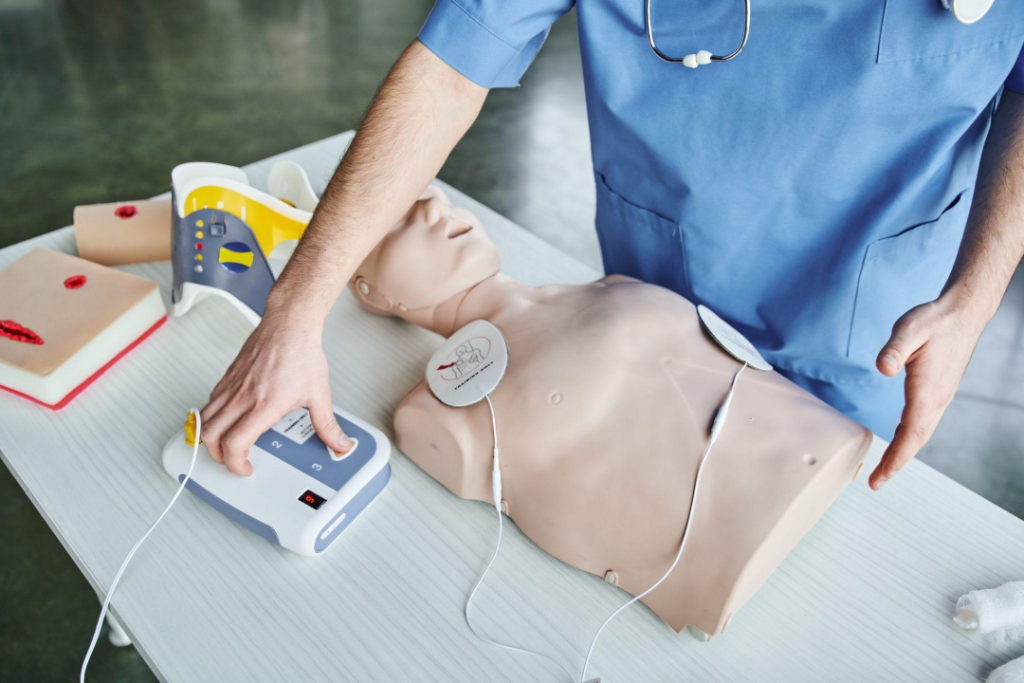Basic Life Support (BLS) certification is a crucial qualification for nurses. It provides them with the necessary skills to respond to emergencies, such as performing CPR, using an AED, and applying life-saving techniques.
The U.S. healthcare system offers various entry-level nursing positions, including roles in hospitals and outpatient clinics. A simple search for "nursing jobs near me" reveals many opportunities available, such as:
BLS certification plays a vital role in these positions:
Your BLS certification serves as a powerful indicator of your commitment to patient care. Many healthcare facilities list it as a mandatory requirement for new hires, making it a crucial element in your nursing career foundation.
"A valid BLS certification can make the difference between securing your desired position and missing out on opportunities in today's competitive healthcare job market."
By obtaining your BLS certification early, you position yourself as a prepared, proactive candidate. This qualification opens doors to various nursing roles, including specialized units and emergency departments where these skills prove invaluable.
To ensure you are adequately prepared for the BLS certification exam, it's beneficial to understand the 6 adult chain of survival, which is a critical aspect of the training. Additionally, utilizing study materials organized into manageable sections can enhance your learning experience.
Moreover, if you're part of a group looking to recertify, consider the ACLS & BLS Recertification Bundle for Groups. This comprehensive package includes everything you need for both ACLS and BLS recertification with guaranteed pass and unlimited retakes if necessary at no charge.

Basic Life Support certification equips healthcare professionals with essential life-saving skills through comprehensive training in emergency response techniques. The certification program covers critical components designed to handle various life-threatening situations:
BLS certification focuses on immediate response scenarios where quick action can mean the difference between life and death. You'll learn specific compression-to-ventilation ratios:
For pediatric cases, the Pediatric Basic Life Support Algorithm provides essential guidelines, especially when two or more rescuers are present.
The American Heart Association (AHA) sets the standard for BLS certification, offering multiple training formats to accommodate different learning styles and schedules:
BLS certification remains valid for two years from the date of completion. The certification process includes:
To ensure understanding and retention of the material, review quizzes are available for each lesson.
To maintain active certification status, you must:
The certification process adapts to modern healthcare needs, with some providers offering remote learning options for the theoretical portion. This flexibility proves particularly valuable for aspiring nurses seeking work-from-home RN positions or those balancing certification requirements with other nursing prerequisites.
For those looking into advanced courses like ACLS, there are numerous ACLS algorithms available that provide detailed procedural guidelines. Additionally, recertification courses are also offered to help healthcare professionals stay current with their certifications.
BLS certification is a crucial requirement for entry-level nursing jobs in medical facilities across the United States. This requirement comes from various regulatory bodies and healthcare standards:
The practical implementation of BLS certification in entry-level nursing positions serves several critical functions:
Medical facilities prioritize BLS-certified nurses for several practical reasons:
Your employability as an entry-level nurse significantly increases with BLS certification. Healthcare employers view this credential as evidence of:
The certification requirement applies across various entry-level nursing settings:
Clinical Settings
In these clinical settings, the importance of proper training and staying updated with guideline changes cannot be overstated. Whether it's responding promptly to a stroke or managing other emergencies, the skills acquired through BLS training are invaluable.
Moreover, the knowledge gained from specific lessons such as understanding stroke protocols or reviewing critical aspects of the BLS course can significantly enhance a nurse's competence and confidence in high-pressure situations.
Additionally, these skills are not only beneficial in clinical roles but also extend to various administrative positions within the healthcare sector such as case management, quality assurance, patient education, and clinical documentation.
Securing your BLS certification before starting your job search gives you a significant competitive edge in the nursing field. Here's why proactive certification benefits your career prospects:
Apply to a wider range of positions, including:
Getting BLS certified early builds practical competence in critical areas:
Your early BLS certification creates valuable opportunities:
Pre-employment certification offers cost benefits:
BLS certification provides hands-on training that builds:
Getting BLS certified before job hunting demonstrates your serious commitment to nursing excellence. This proactive approach shows employers you're ready to handle emergencies from day one, making you a more attractive candidate in competitive nursing markets.
Your certification proves you've mastered essential life-saving skills through proper training and testing. This preparation gives you confidence in your abilities and shows potential employers you're equipped to provide immediate value to their healthcare team.
Additionally, understanding post-resuscitation management, a crucial aspect of patient care following an emergency, can further enhance your profile.

Getting your BLS certification involves several straightforward steps through accredited training providers. The American Heart Association (AHA) and the American Red Cross stand as the primary certification authorities in the United States.
You can find accredited training options for BLS certification through various sources, including:
Many providers offer hybrid learning options, combining online coursework with in-person skills assessment. This flexibility allows you to complete the theoretical portion at your own pace while ensuring hands-on practice for practical skills.
A typical BLS certification course runs 4-6 hours and includes:
It's essential to note that recognizing symptoms of a heart attack is a critical part of the adult CPR training.
When choosing an online certification path, ensure your selected program includes:
To excel in these online studies, consider implementing some of the best study tips tailored for online course takers, which can significantly enhance your learning experience.
Your BLS certification remains valid for two years. The renewal process requires:
The American Heart Association reviews and updates its guidelines every 5 years. Recent changes emphasize:
BLS certification costs vary by provider and location:
Many healthcare employers reimburse certification costs or offer free training to staff members. Some nursing programs include BLS certification as part of their curriculum at no additional cost.
Additionally, while the focus here is on BLS certification, it may also be beneficial to explore PALS courses that provide valuable knowledge on child safety at home, recognizing common household hazards, and emergency response for accidents.
A strong BLS certification paired with additional skills creates a robust foundation for your nursing career. Here's what you need to know about essential complementary certifications:
First aid certification enhances your ability to handle non-cardiac emergencies, making you a more versatile healthcare provider. Many employers value nurses who can respond effectively to diverse medical situations beyond BLS scenarios.
Understanding HIPAA regulations is crucial for protecting patient confidentiality and maintaining legal compliance. You'll need to:
In addition to BLS, obtaining ACLS certification can significantly enhance your skill set. This training includes advanced algorithms that can be crucial during cardiac emergencies. Moreover, mastering the Post Cardiac Arrest Algorithm through specialized courses can further equip you with life-saving skills for critical situations.
These complementary skills strengthen your clinical expertise and increase your value to potential employers. Each certification adds a layer of specialized knowledge to your professional toolkit, helping you provide comprehensive patient care across various healthcare settings.

BLS certification opens doors to numerous entry-level nursing positions across various healthcare settings. Here's a comprehensive look at the job opportunities available:
When searching for nursing positions requiring BLS certification, use specific search terms like "RN jobs near me" or "nursing positions near me" on job boards and healthcare facility websites. Many healthcare organizations list BLS certification as a mandatory requirement in their job postings.
The demand for BLS-certified nurses spans both urban and rural areas. Rural healthcare facilities often offer competitive compensation packages to attract qualified nurses. Urban hospitals provide diverse patient populations and specialized units for career advancement.
Your BLS certification status can influence your placement options. Some facilities hire nurses pending certification completion, while others require active certification before the first day of work. Many employers offer shift differentials, sign-on bonuses, and comprehensive benefits packages for both full-time and part-time positions.
A valid BLS certification acts as a gateway to advanced nursing specialties and career progression opportunities. Your BLS certification demonstrates your readiness to handle critical situations, making you eligible for specialized roles in:
BLS certification serves as a foundation for acquiring advanced certifications, including:
Your career trajectory can expand significantly with these additional certifications built upon your BLS foundation. Many nurses progress from general medical-surgical floors to specialized units, increasing both their expertise and earning potential.
Specialized units requiring BLS and advanced certifications often offer:
Your BLS certification creates a solid platform for pursuing these advanced nursing roles. Each specialty certification you add to your credentials opens new doors for career growth and professional development in critical care environments.
For instance, understanding the Adult Tachycardia with a Pulse Algorithm can significantly enhance your skill set in emergency departments. Moreover, knowing the proper techniques for moving victims during emergencies can be crucial in saving lives.
As technology evolves, it's also important to stay informed about the impact of AI on emergency cardiac care, which is transforming diagnosis, treatment precision, and patient outcomes through advanced data analysis and real-time decision support.
Let's tackle some persistent myths about BLS certification that often confuse aspiring nurses:
Myth #1: BLS certification is optional for entry-level nurses
Reality: Most healthcare facilities require BLS certification as a mandatory credential for all nursing staff, including entry-level positions. This requirement stems from patient safety standards and regulatory compliance.
Myth #2: Online BLS certifications aren't valid
Reality: Many accredited organizations offer legitimate online BLS certification courses. The key is choosing a program utilizing the American Heart Association or American Red Cross guidelines.
Myth #3: BLS is just another name for CPR
Reality: While CPR is a crucial component, BLS certification encompasses additional skills:
Myth #4: You can't start working until you have BLS certification
Reality: Some healthcare facilities offer conditional employment, providing a grace period to obtain certification. You'll need to verify specific employer policies during your job search.
Myth #5: BLS certification requires previous medical experience
Reality: The certification is designed for both healthcare professionals and beginners. No prior medical experience is needed to enroll in a BLS course.
Myth #6: Once certified, you're certified for life
Reality: BLS certification requires renewal every two years to ensure your skills align with current medical guidelines and best practices.
BLS certification is a crucial part of nursing practice, going beyond basic job requirements to become essential for providing excellent patient care. As a nurse, you need to constantly improve your life-saving skills, and BLS certification is just the starting point on this lifelong learning journey.
Think of BLS certification as the base for advanced certifications you'll pursue throughout your career. Each time you renew your certification, you'll have the chance to:
The answer to the question "Is BLS Certification Necessary for Entry-Level Nursing Jobs?" is clear: Yes. This certification not only fulfills employer requirements but also empowers you to save lives right from the beginning of your nursing career.
Your commitment to keeping your BLS certification current shows your dedication to:
Make BLS certification an essential part of your professional development plan. See it as an investment in your career rather than just a requirement for your resume. Your patients deserve a nurse who is ready for any emergency – BLS certification ensures that you are prepared to respond when needed.
.jpg)

